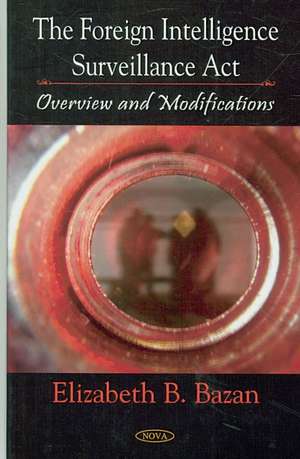The Foreign Intelligence Surveillance Act
Autor Elizabeth B. Bazanen Limba Engleză Hardback – 29 feb 2008
| Toate formatele și edițiile | Preț | Express |
|---|---|---|
| Paperback (1) | 185.87 lei 3-5 săpt. | |
| Nova Science Publishers Inc – feb 2003 | 185.87 lei 3-5 săpt. | |
| Hardback (1) | 478.33 lei 3-5 săpt. | |
| Nova Science Publishers Inc – 29 feb 2008 | 478.33 lei 3-5 săpt. |
Preț: 478.33 lei
Preț vechi: 651.21 lei
-27% Nou
Puncte Express: 717
Preț estimativ în valută:
91.53€ • 97.88$ • 76.31£
91.53€ • 97.88$ • 76.31£
Carte disponibilă
Livrare economică 27 martie-10 aprilie
Preluare comenzi: 021 569.72.76
Specificații
ISBN-13: 9781604561517
ISBN-10: 1604561513
Pagini: 165
Dimensiuni: 162 x 235 x 17 mm
Greutate: 0.45 kg
Editura: Nova Science Publishers Inc
ISBN-10: 1604561513
Pagini: 165
Dimensiuni: 162 x 235 x 17 mm
Greutate: 0.45 kg
Editura: Nova Science Publishers Inc
Cuprins
Preface; P.L. 110-55, the Protect America Act of 2007: Modifications to the Foreign Intelligence Surveillance Act; The Foreign Intelligence Surveillance Act: An Overview of the Statutory Framework and U.S. Foreign Intelligence Surveillance Court and U.S. Foreign Intelligence Surveillance Court of Review Decisions; Index.













